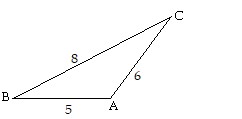Use Heron's formula to determine the area of the triangle. If necessary, round the answer to two decimal places. 
A. 195.03
B. 14.98
C. 44.74
D. 4.86
Answer: B
You might also like to view...
Solve the problem.The motion of an imaginary ball bouncing along a flat, level surface, such that each bounce is identical in peak height and horizontal velocity to the bounce before it, is modeled by the following functional relationship between the instantaneous height, f(x), of the ball above the flat surface and the horizontal position, x, of the ball along the surface:
 Find ao, two nonzero cosine terms (if they exist), and two nonzero sine terms (if they exist) of the Fourier series for this description of motion.
Find ao, two nonzero cosine terms (if they exist), and two nonzero sine terms (if they exist) of the Fourier series for this description of motion.
A. f(x) =  - 4
- 4
B. f(x) =  -
- 
C. f(x) =  -
- 
D. f(x) =  +
+ 
Solve the linear inequality. Express the solution using set-builder notation and interval notation. Graph the solution set.8x - 6 ? 7x - 6![]()
A. {x|x ? 0}; [0, ?)![]()
B. {x|x ? 1}; (-?, 1]![]()
C. {x|x ? 12}; [12, ?)![]()
D. {x|x > - 12}; (- 12, ?)![]()
Factor completely. If the polynomial is prime, so state.20x4 - 23x3 + 6x2
A. x(4x + 3)(5x + 2) B. x2(4x - 3)(5x - 2) C. (20x2 + 3)(x2 + 2) D. x2(20x - 1)(x - 6)
Provide an appropriate response.If P(A) = P(A|B), why must P(B) = P(B|A)?
What will be an ideal response?